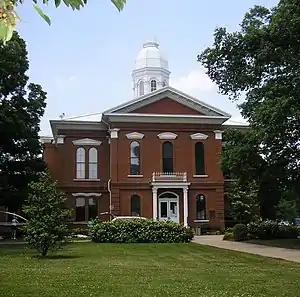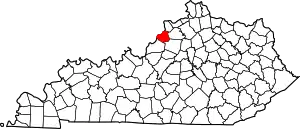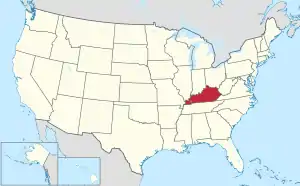Oldham County, Kentucky
Oldham County is a county located in the north central part of the U.S. state and commonwealth of Kentucky. As of the 2020 census, the population was 67,607.[1] Its county seat is La Grange.[2] The county is named for Colonel William Oldham.
Oldham County | |
|---|---|
 Oldham County courthouse in La Grange | |
 Flag  Seal | |
 Location within the U.S. state of Kentucky | |
 Kentucky's location within the U.S. | |
| Coordinates: 38°24′N 85°26′W | |
| Country | |
| State | |
| Founded | December 15, 1823 |
| Named for | William Oldham (1753–1791), American Revolutionary War colonel |
| Seat | La Grange |
| Largest city | La Grange |
| Area | |
| • Total | 196 sq mi (510 km2) |
| • Land | 187 sq mi (480 km2) |
| • Water | 9.2 sq mi (24 km2) 4.7% |
| Population (2020) | |
| • Total | 67,607 |
| • Estimate (2022) | 69,431 |
| • Density | 340/sq mi (130/km2) |
| Time zone | UTC−5 (Eastern) |
| • Summer (DST) | UTC−4 (EDT) |
| Congressional district | 4th |
| Website | www |
Oldham County is part of the Louisville/Jefferson County, KY–IN Metropolitan Statistical Area.
Oldham County is the wealthiest county in Kentucky[3] and 47th-wealthiest county in the U.S.[4] and ranks as the most educated county in Kentucky [5] While the causes for this are complicated, areas east of Louisville have long been popular with wealthy residents, initially as summer residences and eventually as year-round suburban estates and bedroom communities. Oldham County lies northeast of the best known of these areas, Anchorage, just outside Louisville's pre-merger East End.
History
Oldham County was established on December 15, 1823, from parts of Henry, Jefferson, and Shelby Counties.[6] It was the 74th Kentucky county, and was named in honor of Col. William Oldham of Jefferson County, a Revolutionary War officer.[7]
Initially, it was mainly a rural county with small, scattered developments in places like Westport which was founded in 1800 and served as the county seat early on. When the Louisville and Frankfort Railroad Company introduced rail lines in the area in the 1850s, many new towns and communities sprang up. Eventually the railroad ceased operating as a form of public transportation, but the more rural nature of the county continued to draw residents away from the metropolitan areas in Jefferson County. Since the early 1970s and the completion of Interstate 71, which connects Oldham County to Downtown Louisville and shopping in Eastern Jefferson County, Oldham County has increasingly become suburban in nature, a natural extension of Louisville's wealthy East End as it ran out of large tracts of undeveloped land.
Geography
According to the United States Census Bureau, the county has a total area of 196 square miles (510 km2), of which 187 square miles (480 km2) are land and 9.2 square miles (24 km2) (4.7%) are covered by water.[8] It is the 13th-smallest county in Kentucky. The county's northern border with Indiana is formed by the Ohio River.
Adjacent counties
- Clark County, Indiana (northwest)
- Trimble County (northeast)
- Henry County (east)
- Shelby County (southeast)
- Jefferson County (southwest)
Demographics
| Census | Pop. | Note | %± |
|---|---|---|---|
| 1830 | 9,588 | — | |
| 1840 | 7,380 | −23.0% | |
| 1850 | 7,629 | 3.4% | |
| 1860 | 7,283 | −4.5% | |
| 1870 | 9,027 | 23.9% | |
| 1880 | 7,667 | −15.1% | |
| 1890 | 6,754 | −11.9% | |
| 1900 | 7,078 | 4.8% | |
| 1910 | 7,248 | 2.4% | |
| 1920 | 7,689 | 6.1% | |
| 1930 | 7,402 | −3.7% | |
| 1940 | 10,716 | 44.8% | |
| 1950 | 11,018 | 2.8% | |
| 1960 | 13,388 | 21.5% | |
| 1970 | 14,687 | 9.7% | |
| 1980 | 27,795 | 89.2% | |
| 1990 | 43,455 | 56.3% | |
| 2000 | 46,178 | 6.3% | |
| 2010 | 60,316 | 30.6% | |
| 2020 | 67,607 | 12.1% | |
| 2022 (est.) | 69,431 | [9] | 2.7% |
| U.S. Decennial Census[10] 1790-1960[11] 1900-1990[12] 1990-2000[13] 2010-2020[1] | |||
As of the census[14] of 2000, there were 46,178 people, 14,856 households, and 12,196 families residing in the county. The population density was 244 per square mile (94/km2). There were 15,541 housing units at an average density of 82 per square mile (32/km2). The racial makeup of the county was 93.62% White, 4.21% Black or African American, 0.21% Native American, 0.44% Asian, 0.01% Pacific Islander, 0.55% from other races, and 0.97% from two or more races. 1.30% of the population were Hispanic or Latino of any race.
There were 14,856 households, out of which 44.10% had children under the age of 18 living with them, 71.50% were married couples living together, 7.80% had a female householder with no husband present, and 17.90% were non-families. 14.90% of all households were made up of individuals, and 4.80% had someone living alone who was 65 years of age or older. The average household size was 2.85 and the average family size was 3.17.
The age distribution was 27.40% under the age of 18, 6.90% from 18 to 24, 33.10% from 25 to 44, 25.60% from 45 to 64, and 7.00% who were 65 years of age or older. The median age was 37 years. For every 100 females, there were 114.00 males. For every 100 females age 18 and over, there were 117.90 males.
The median income for a household in the county was $70,171 (2005), and the median income for a family was $70,495. Males had a median income of $46,962 versus $28,985 for females. The per capita income for the county was $25,374. About 2.90% of families and 4.10% of the population were below the poverty line, including 4.50% of those under age 18 and 6.00% of those age 65 or over. Oldham County is the most affluent county in the state of Kentucky; most residents work in Louisville and choose to live in Oldham County due to the lack of crime and the nationally recognized school system. North Oldham High School in particular, is ranked very highly among state high schools, having been named a national blue ribbon school of excellence, and ranked in the top 250 best schools in the nation through Us Weekly. 2006 classes at Oldham County High School were reported as to have a teacher:student ratio of 1:15, but that number does not accurately reflect the ratio of a normal class. That number includes, for example, the small classes of five to six students in Behavioral Disorders. The published ratio also includes small classes at the County Career Center, which is located on the same campus. The actual teacher-student ratios are closer to 1:30. Regardless of population swelling and diminishing student-teacher ratios, which have led to a slight decline as of late, Oldham county is still widely recognized as the best public school system in the state.
Communities
Cities
- Crestwood
- Goshen
- La Grange (county seat)
- Orchard Grass Hills
- Pewee Valley
- Prospect (mostly in Jefferson County)
- River Bluff
Other unincorporated places
Politics
| Year | Republican | Democratic | Third party | |||
|---|---|---|---|---|---|---|
| No. | % | No. | % | No. | % | |
| 2020 | 22,654 | 59.65% | 14,505 | 38.20% | 817 | 2.15% |
| 2016 | 20,469 | 62.30% | 10,268 | 31.25% | 2,116 | 6.44% |
| 2012 | 20,179 | 67.52% | 9,240 | 30.92% | 465 | 1.56% |
| 2008 | 18,997 | 64.80% | 10,000 | 34.11% | 319 | 1.09% |
| 2004 | 18,801 | 69.29% | 8,080 | 29.78% | 251 | 0.93% |
| 2000 | 13,580 | 67.00% | 6,236 | 30.77% | 452 | 2.23% |
| 1996 | 10,477 | 57.25% | 6,202 | 33.89% | 1,622 | 8.86% |
| 1992 | 8,263 | 49.66% | 5,457 | 32.80% | 2,919 | 17.54% |
| 1988 | 8,716 | 68.14% | 4,025 | 31.46% | 51 | 0.40% |
| 1984 | 8,112 | 73.81% | 2,857 | 25.99% | 22 | 0.20% |
| 1980 | 5,586 | 58.74% | 3,487 | 36.67% | 437 | 4.60% |
| 1976 | 3,695 | 55.72% | 2,819 | 42.51% | 117 | 1.76% |
| 1972 | 3,041 | 68.00% | 1,311 | 29.32% | 120 | 2.68% |
| 1968 | 1,655 | 41.45% | 1,399 | 35.04% | 939 | 23.52% |
| 1964 | 1,256 | 32.34% | 2,622 | 67.51% | 6 | 0.15% |
| 1960 | 2,221 | 53.12% | 1,960 | 46.88% | 0 | 0.00% |
| 1956 | 2,128 | 54.44% | 1,769 | 45.25% | 12 | 0.31% |
| 1952 | 1,723 | 49.57% | 1,735 | 49.91% | 18 | 0.52% |
| 1948 | 1,036 | 35.49% | 1,703 | 58.34% | 180 | 6.17% |
| 1944 | 1,021 | 34.65% | 1,908 | 64.74% | 18 | 0.61% |
| 1940 | 848 | 29.85% | 1,983 | 69.80% | 10 | 0.35% |
| 1936 | 760 | 27.20% | 2,020 | 72.30% | 14 | 0.50% |
| 1932 | 888 | 27.47% | 2,319 | 71.73% | 26 | 0.80% |
| 1928 | 1,604 | 54.02% | 1,359 | 45.77% | 6 | 0.20% |
| 1924 | 906 | 31.30% | 1,954 | 67.50% | 35 | 1.21% |
| 1920 | 1,014 | 27.52% | 2,655 | 72.07% | 15 | 0.41% |
| 1916 | 642 | 30.34% | 1,455 | 68.76% | 19 | 0.90% |
| 1912 | 261 | 14.88% | 1,159 | 66.08% | 334 | 19.04% |
Government
At the federal level, Oldham County overlaps two congressional districts in the House of Representatives, the third district, represented by Democrat Morgan McGarvey, and the fourth district, represented by Republican Thomas Massie.[16]
Notable people
- D. W. Griffith, highly influential film director (The Birth of a Nation, Intolerance)
- Kyra Elzy, women's collegiate basketball player and coach of Kentucky Wildcats women's basketball
- Buddy Pepper, former songwriter, pianist, composer, arranger, and actor.
- Knocked Loose, a hardcore band signed to Pure Noise Records
- Justin Thomas, a Professional golfer
- Dean Kiekhefer, MLB pitcher
- Jon Rauch, MLB pitcher
- Donta Smith, professional basketball player
See also
References
- "State & County QuickFacts". United States Census Bureau. Retrieved June 30, 2022.
- "Find a County". National Association of Counties. Retrieved June 7, 2011.
- "Oldham County KY Data & Peer Group Rankings". kentucky.hometownlocator.com. Retrieved January 31, 2018.
- "Wealthiest counties in the U.S." Retrieved October 25, 2020.
- "Most educated county in every state". Retrieved October 15, 2020.
- "Oldham County". The Kentucky Encyclopedia. 2000. Retrieved August 23, 2014.
- The Register of the Kentucky State Historical Society, Volume 1. Kentucky State Historical Society. 1903. p. 36.
- "2010 Census Gazetteer Files". United States Census Bureau. August 22, 2012. Archived from the original on August 12, 2014. Retrieved August 19, 2014.
- "Annual Estimates of the Resident Population for Counties: April 1, 2020 to July 1, 2022". United States Census Bureau. Retrieved April 2, 2023.
- "U.S. Decennial Census". United States Census Bureau. Retrieved August 19, 2014.
- "Historical Census Browser". University of Virginia Library. Retrieved August 19, 2014.
- "Population of Counties by Decennial Census: 1900 to 1990". United States Census Bureau. Retrieved August 19, 2014.
- "Census 2000 PHC-T-4. Ranking Tables for Counties: 1990 and 2000" (PDF). United States Census Bureau. Archived (PDF) from the original on March 27, 2010. Retrieved August 19, 2014.
- "U.S. Census website". United States Census Bureau. Retrieved January 31, 2008.
- Leip, David. "Dave Leip's Atlas of U.S. Presidential Elections". uselectionatlas.org. Retrieved July 5, 2018.
- "House.gov". Ziplook.house.gov. Retrieved July 23, 2019.